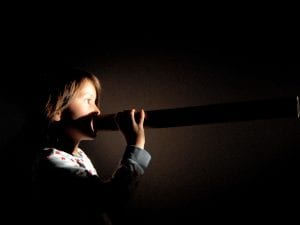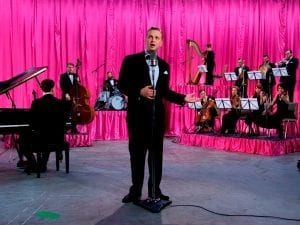Battersea Arts Centre brings people closer to theatre with the One-on-One Festival, exploring the relationships between audience and performer.
Audience participation in theatre is an intimidating prospect for most people. The idea of being dragged onstage in front of friends and family to participate in a performance is mortifying. Yet, despite this, 2011 is the second year that Battersea Arts Centre (BAC) is staging its One-on-One Festival and tickets are selling fast. For an event that specialises in extraordinary performances played out for one audience member at a time in a series of intimate one-on-one encounters that’s pretty phenomenal. David Jubb, one of BAC’s two artistic directors, explains that when they first decided to develop the Festival and celebrate this most intimate of theatre formats they discovered something fascinating: “The people that it’s most intimidating for tend to be theatre audiences because they know how awful audience participation can be, so the threat of a one-on-one performance for those particular audiences can be terrifying.” This in turn meant that the audience the 2010 One-on-One Festival actually succeeded in attracting was outside the usual pool of theatre-goers: “Whilst the work is the cutting-edge of new theatre practice, it’s also really accessible. We were amazed last July because the audience was just so incredibly diverse.”
The Festival format offers a great deal of support in encouraging people to experience this sort of work, not least because it allows BAC to present over 28 different performances of one-on-one work over two weeks. This is important with an art form that could potentially attract only a limited number of participants: “One of the risks of the work is that it is ultimately one audience member at a time, so if you present a piece of one-on-one work over a two or three day period it might be that you can only get 60 people to see it.” By using the festival structure it means that a larger audience can be built up for the work. It also means that a communitas is created amongst the participants: audience members are given stickers to show what sort of performances they’ve been to so that similar experiences can be shared and discussed. David Jubb explains that last year “people were having quite personal, intimate experiences but then really wanting to talk to people about the experiences they’d had. The conversations in the foyer were just remarkable.”
This is one of the reasons why BAC built a dining experience into the Festival this year; to further develop and encourage the opportunity for people to sit and share the work that they have seen. In addition to this they are also holding an “Overnight Open Space”, giving audiences an opportunity to stay at the building late into the night to confide and partake in discussions about intimacy and performance. The idea of prolonging work and instigating a conversation and a legacy around something like performance, which is by its nature transient, is something that BAC has been working on for some time now. Their “Playgrounding” process was developed in partnership with architects Haworth Tompkins, also the architects for the Royal Court Theatre and the Young Vic. Jubb puts their ambitions very concisely: “Playground projects is about how we use the theatre that we make to leave legacies for the building.” In practice this meant opening up 35 new spaces when BAC collaborated with innovative British theatre company, Punchdrunk, to make The Masque of the Red Death in 2007 and putting the long-disused chimneys in the building back into action. Now the spaces are used in numerous different ways, for weddings, exams and parties, and the chimneys have been complemented by two woodburning stoves in the cafe/bar area, creating a convivial atmosphere in which to share experiences and thoughts on the events at the Centre.
The One-on-One Festival will contribute to this ongoing objective: this year there is a series of exciting new additions, set in bedroom spaces that have been developed by the artists. These works include You Only Live Twice (But Die Once) with Kazuko Hohki and Melanie Wilson’s Self-Portrait with Frida, in which Wilson has created a room reminiscent of Frida Kahlo’s bedroom and encourages the audience member to partake in the making of a self-portrait to contribute to the surroundings. Jubb explains how these commissions will enrich the building: “Once the One-on-One Festival finishes, we’ll have six very uniquely different bedrooms all having been created and used in the Festival and those unique worlds will each become a residency space for artists and they’ll be able to stay in the building for up to four months at a time to live and work and eat and sleep.” The addition of resident artists to the Battersea Arts Centre means that the venue will develop a kind of society and exist as a fully living, breathing building. This change appears to be one of those defining moments in an organisation’s legacy and Jubb is confident that having the artists living in the Centre will have a profound impact. Inspiration doesn’t work 9 to 5 and the artists in residence programme is designed to further encourage the flexible nature of creativity and an intimate relationship with the building and its many functions.
Intimacy seems to be the cornerstone of the projects commissioned and created by Battersea Arts Centre, evidenced by their support of one-on-one theatre: “We’re really excited about it as a form, because it’s ultimately about the relationship between an artist and an audience member, and what can happen. It’s quite exciting and visceral; it gets to the heart of what theatre is.” If theatre is designed to stimulate and affect people then the One-on-One Festival certainly achieves this; it offers a unique combination of performances, many of which are highly personal and some of which are extremely challenging, and Jubb remarks that last year there were a number of people profoundly moved by their experiences.
There is a degree of intensity that accompanies these searching performances, though, which may make some people uncomfortable. One piece in particular that comes to mind is Adrian Howells’ The Pleasure of Being: Washing, Feeding and Holding in which the audience member is fully bathed, fed and then hugged by the artist. This level of closeness crosses the boundary of most people’s comfort zone; however the beauty of this Festival is the way in which it can connect to the individual and the reasons that people do choose to participate in Howells’ piece can be intensely personal. Last year a woman attended the Festival specifically to partake in this performance: her mother had been ill for six months and she had started to bathe her and care for her and she wanted to stand in her mother’s shoes for a day and learn what that experience was like.
Jubb is aware that people have varying degrees of comfort and boundaries, though, and the Festival is carefully curated to appeal to a range of tastes. Ten different menus are offered, with choices from “Dreamy” to “Immersive” and an accompanying “chilli chart” in the nature of Indian restaurants, demonstrating the intensity of the experience: “While some of it is challenging or personal, there’s lots of other work that’s fun and playful.” In spite of this, it seems that the challenging menu was the one that sold the quickest, proving that many people are open to pushing themselves that bit further.
From the projects they run it’s clear that Battersea Arts Centre is passionate about theatre re-engaging with audiences, something which is entirely necessary if theatre is to continue to occupy the position it does within the British arts scene. Jubb is adamant that theatre has to retain its dynamism if it is to remain a relevant art form: “I think one-on-one work is another iteration of how theatre refreshes itself and reminds itself about how it must be live: it’s doing that job of reminding all theatre-makers and audiences of the vital nature of the art form.” In a landscape where our priorities over the arts are constantly shifting, events such as the One-on-One Festival are crucial in bringing people closer to theatre and keeping it significant to our times.
The One-on-One Festival took place at Battersea Arts Centre until 9 April 2011 and the ongoing work of their resident artists and other theatre-makers can be seen at their tri-weekly Scratch nights. Scratch nights take place on Thursday, Friday and Saturday evenings and are a place to watch work grow and to share feedback on ideas. Please visit www.bac.org.uk for more information and tickets.
Bryony Byrne





